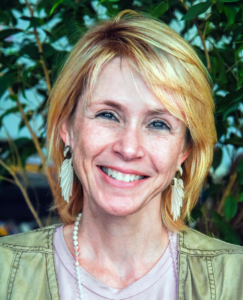Tale as Old as Time:
The Transformative Power of Fairy Tales for Every Age
By Kathie Collins
For the better part of a year when my youngest daughter was three, bedtime meant reading Goldilocks and the Three Bears. While she might allow an additional story or two to accompany her preferred narrative, our entire family understood there was no escaping the required reading, complete with dialogue performed in character. I was her most frequent reader/actor, but thankfully (the job could take a real toll on my vocal cords) I was backed by a team of capable understudies that included her grandmothers, beloved babysitters, and, when necessary, her six- and eight-year-old sisters.
I’m sure I must have asked, more than once, Why this story, again? I don’t recall her response. In any event, what a ridiculous question. Reading this story was a ritual that lasted for as long as it was meaningful to her, until she had absorbed whatever she needed from it and was ready to move onto a tale that would nourish her in new ways.
Reading, and being read to, is a kind of ritual, of course. But some types of literature, fairy and folk tales in particular, work on us at the ritual level, that is, the same mythic or archetypal layer of psyche activated by religious and spiritual rituals. They come to us from beyond time and place, draw us into a world that often makes no rational sense, and speak to us in a language of symbols. Which doesn’t mean they are esoteric.
To the contrary, strange as they seem to modern ears, fairy tales generally present “typical” human situations, usually within the realms of family and local community. Very often, they are about growing up, leaving home, finding a way through the forest, and getting married. Even so, stripped of specific setting and the kind of character development found in most contemporary literature, a classic tale employs motifs and repeating patterns that seem more like the recitation of a dream than what we’ve come to think of as a short story. Some scholars even argue that certain tales may have originated from dreams.
Whatever their source material, classic fairy tales emerged in oral traditions in which stories were retold frequently within multi-generational communities, with variations occurring over time and as they spread from one locale to another. Stories were shared round the same hearths where families shared music and food, where children were bounced upon knees and babes were rocked to sleep. Storytelling was an embodied experience. A listener likely took in a tale’s surface narrative immediately, recognizing in the flicker of firelight the parallels to their own lives. No doubt, however, the spirit of a special tale could linger a few nights or weeks—months even—in the bones, generate a longing to hear it told again. To hear it differently. To hear what one might have missed. To work the motifs over like koans. To find the tale’s essence, the secret meant for the listener alone.
Although reading rarely provides this kind of communal experience today, I believe the magic of the fairy tale experience persists. The archetypal power of the genre remains uniquely compressed within these classic tales, inviting us to re-read, analyze, retell—and, in so doing, to discover unrecognized patterns in our own life journeys. And through this recognition, we may find new paths through the forest—paths filled with life and meaning.
Study Fairy Tales with Kathie
FOUR WEDNESDAYS, MARCH 5–26: “Four Weeks, Four Fairy Tales,” 6:00–8:00 p.m., virtual via Zoom. Info and registration
Have you ever wondered why particular fairy tales persist in our culture, enchanting young and old alike? Are you curious about the connections between fairy tales, dreams, and literature? If so, join mythologist and Charlotte Lit cofounder Kathie Collins for a month-long journey into these magical realms. We’ll focus on a new tale each week, studying various methods of interpretation — feminist, structural, and archetypal — along with contemporary retellings. We’ll also discuss possibilities for writing the stories forward, ending each session with a take-home prompt. Expect light pre-class reading, in-class reading and discussion, take-home writing, and optional sharing.
“Myths and fairytales give expression to unconscious processes, and their retelling causes these processes to come alive again and be recollected, thereby re-establishing the connection between conscious and unconscious.”—C. G. Jung
Members save $60 on this class. Log in as a member or join to receive the discount.
About Kathie
Kathie Collins, co-founder and creative director of Charlotte Lit and editor-in-chief of Charlotte Lit Press, is a poet, mythologist, and lifelong student of Jungian psychology—which, consciously and unconsciously, makes its way into her work. She earned her graduate degrees in mythological studies at Pacifica Graduate Institute, where she also served as adjunct faculty. Kathie is author of Jubilee (Main Street Rag). Her poems have appeared in Flying South, Immanence, Kakalak, Major 7th Magazine, Pedestal Magazine, and Santa Fe Literary Review. She’s a 2023 Pushcart nominee, and her poetry manuscript Grass Widow was named a finalist in both the Iron Horse Lit Review and Palette Poetry 2023 Chapbook competitions.

